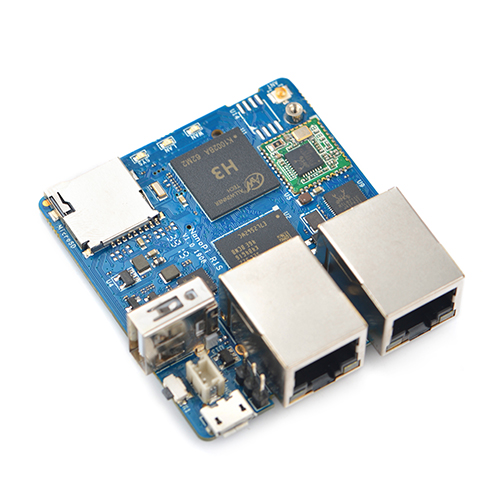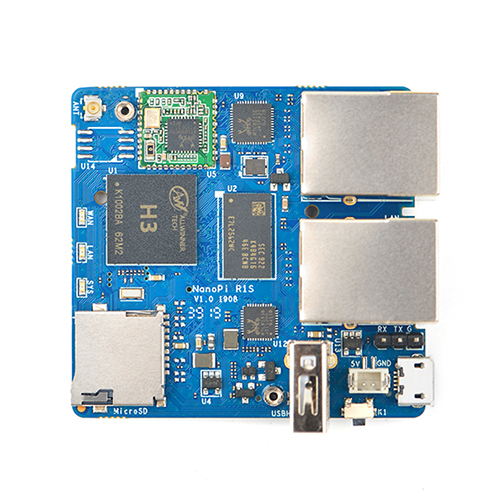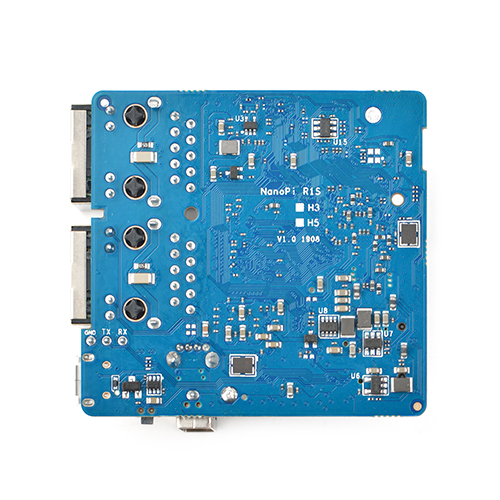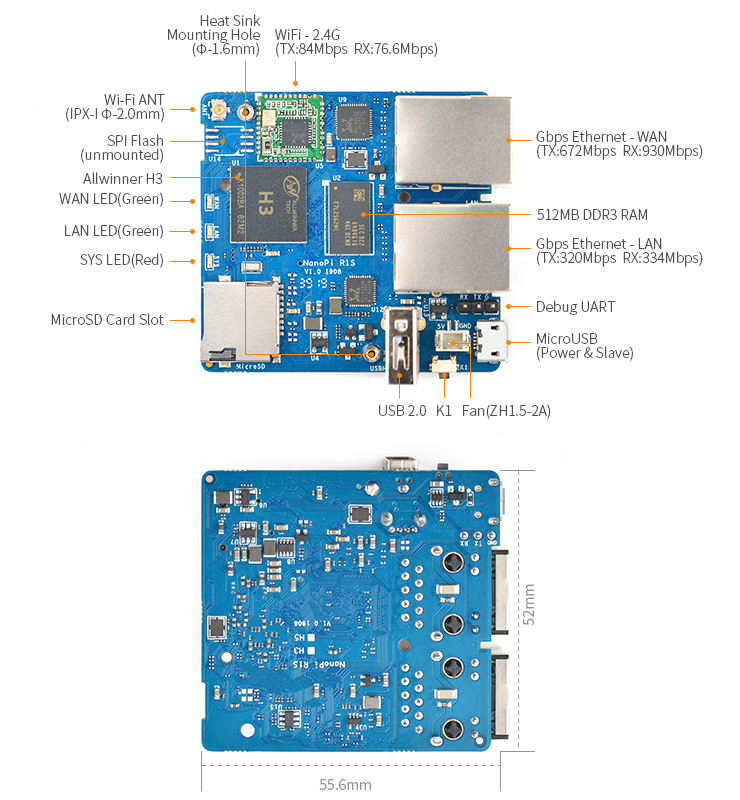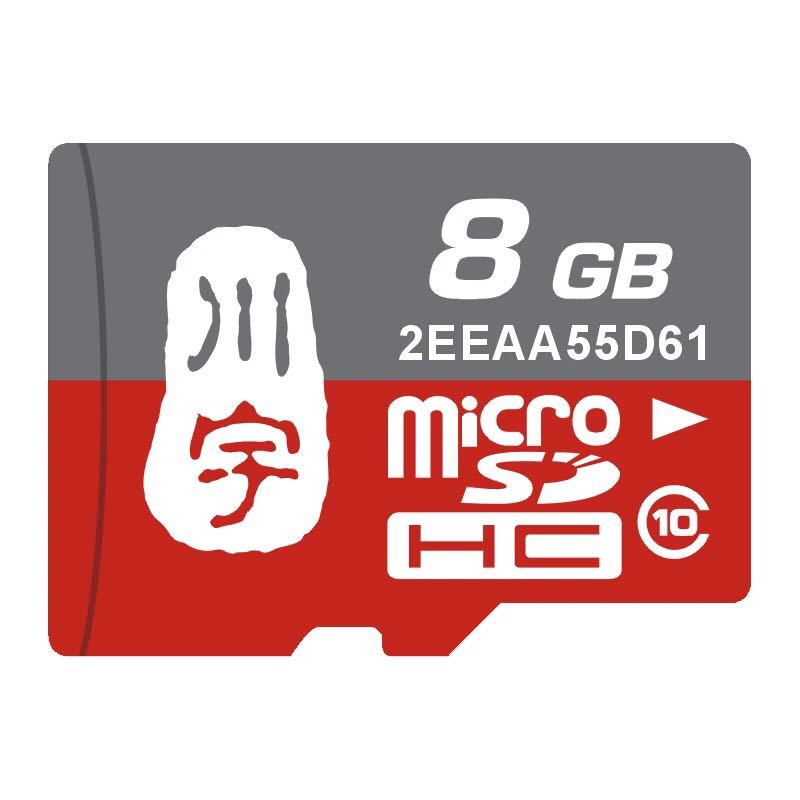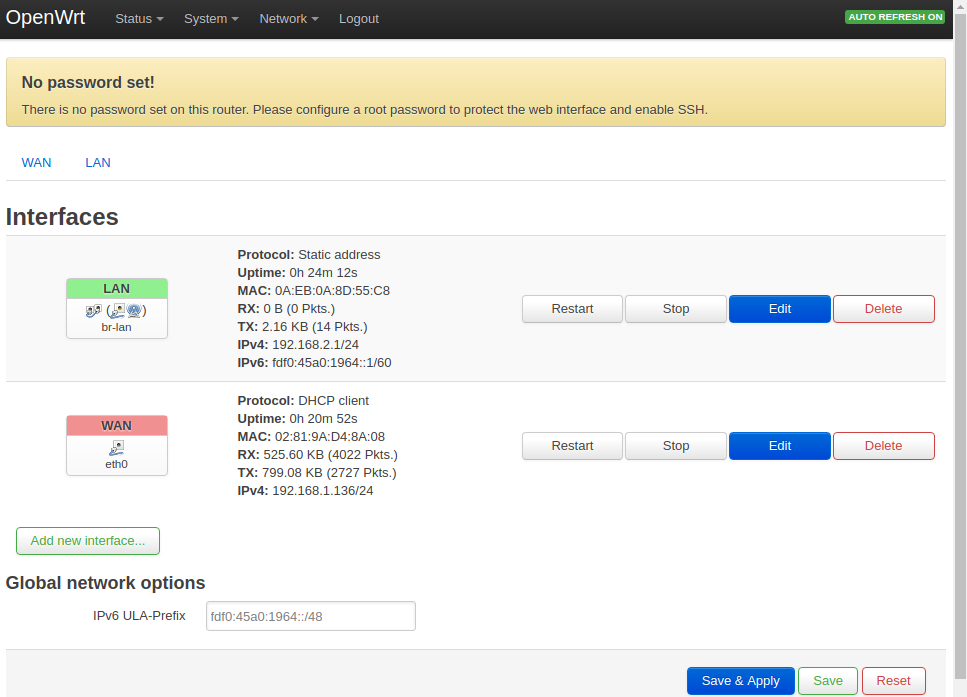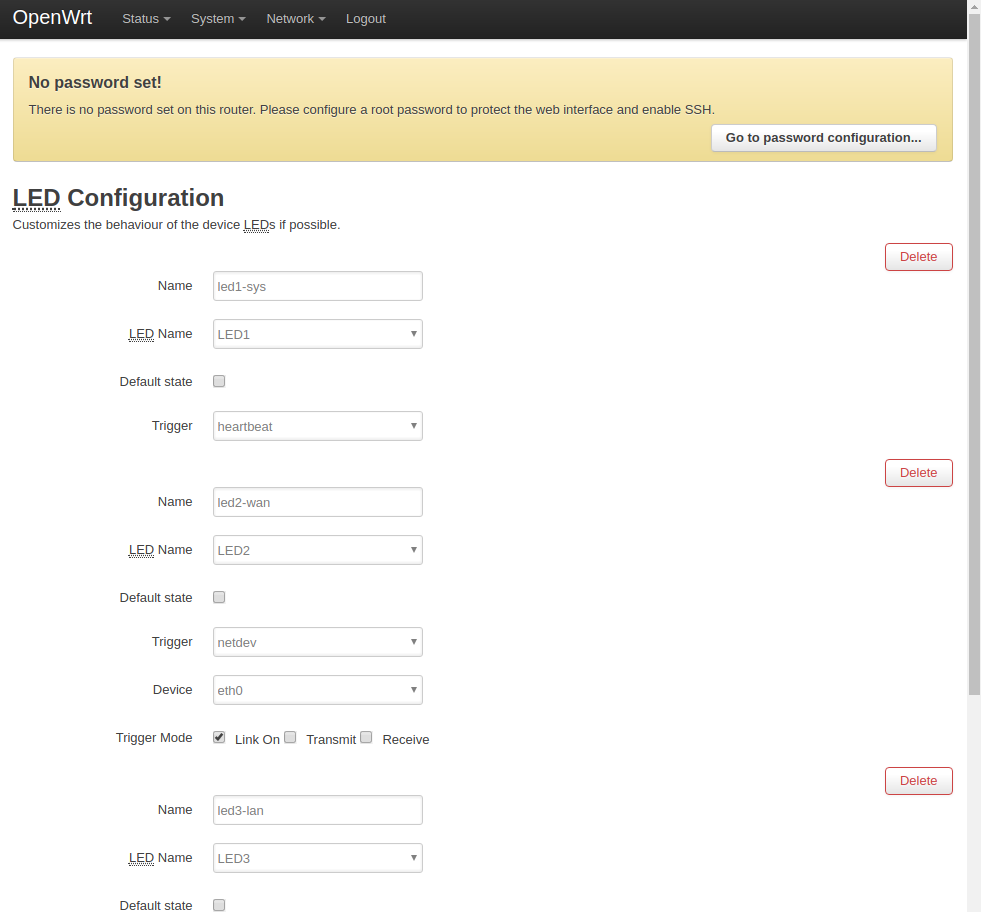NanoPi R1S-H3
Contents
- 1 Introduction
- 2 Hardware Spec
- 3 接口布局和尺寸
- 4 快速入门
- 5 Work with OpenWrt
- 6 Work with FriendlyCore
- 6.1 Introduction
- 6.2 System Login
- 6.3 Configure System with npi-config
- 6.4 Develop Qt Application
- 6.5 Setup Program to AutoRun
- 6.6 Extend TF Card's Section
- 6.7 WiFi
- 6.8 Ethernet Connection
- 6.9 Custom welcome message
- 6.10 Modify timezone
- 6.11 Connect to USB Camera(FA-CAM202)
- 6.12 Check CPU's Working Temperature
- 6.13 Test Infrared Receiver
- 6.14 How to install and use docker (for armhf system)
- 7 Developer's Guide
- 8 资源链接
- 9 ChangeLog
1 Introduction
- The NanoPi R1S(as "R1S")is an open source IoT ARM board designed and developed by FriendlyElec for hobbyists, makers and developers.
- The NanoPi R1S has two Gbps Ethernet ports, an onboard 2.4G Wi-Fi module. FriendlyElec ported OpenWrt for the NanoPi R1S. By applying some simple configurations it will work as a router.
2 Hardware Spec
- CPU: Allwinner H3, Quad-core Cortex-A7 Up to 1.2GHz
- DDR3 RAM: 512MB
- Network:
- 10/100/1000M以太网口 x 1
- USB2.0转10/100/1000M以太网口 x 1
- Wi-Fi: 802.11b/g/n,提供IPX天线接口(第一代,圆环直径2.0mm)。
- USB Host: Type-A x1
- MicroSD Slot x 1
- MicroUSB: 供电和Slave功能
- Debug Serial Port: 3.3V TTL电平,3Pin 2.54mm间距排针
- LED: LED x 3
- KEY: KEY x 1 用户自定义功能
- PC Size: 55.6 x 52mm
- Power Supply: DC 5V/2A
- Temperature measuring range: -20℃ to 70℃
- OS/Software: U-boot,Ubuntu-Core,OpenWrt
- 实测网络速率
TX RX WAN 672 Mbps 930 Mbps LAN 320 Mbps 334 Mbps WiFi-2.4G 84 Mbps 76.6 Mbps Notes: 1、测试工具:iperf
2、使用独立IP地址段和PC机单向通讯测试
3 接口布局和尺寸
3.1 接口布局
- 更详细的信息请查看原理图:[httpic.pdf NanoPi_R1S_V1.0_1908-Schematic.pdf]
3.2 机械尺寸
File:NanoPi R1S-dimensions.png
- 详细尺寸:[httpXF.rar NanoPi R1S PCB的dxf文件]
4 快速入门
4.1 准备工作
要开启你的NanoPi R1S-H3新玩具,请先准备好以下硬件
- NanoPi R1S-H3主板
- MicroSD卡/TF卡: Class10或以上的 8GB SDHC卡
- 一个MicroUSB接口的外接电源,要求输出为5V/2A(可使用同规格的手机充电器)
- 一台电脑,需要联网,建议使用Ubuntu 16.04 64位系统
4.2 经测试使用的TF卡
制作启动NanoPi R1S-H3的TF卡时,建议Class10或以上的 8GB SDHC卡。以下是经友善电子测试验证过的高速TF卡:
- SanDisk闪迪 TF 8G Class10 microSD 高速 TF卡:
- SanDisk闪迪 TF 128G 至尊高速 Class10 microSDXC TF 128G 48MB/S:
- 川宇 8G手机内存卡 TF 8G 卡存储卡 C10 高速 Class10 microSD卡:
4.3 安装系统
4.3.1 下载系统固件
首先访问下载地址下载需要的固件文件(officail-ROMs目录)和烧写工具(tools目录):
使用以下固件: nanopi-r1s-h3_sd_friendlycore-xenial_4.14_armhf_YYYYMMDD.img.zip 基于 UbuntuCore 构建的 FriendlyCore 系统固件,使用 Linux-4.14内核 nanopi-r1s-h3_sd_friendlywrt_4.14_armhf_YYYYMMDD.img.zip 基于 OpenWrt 构建的 FriendlyWrt 系统固件,使用 Linux-4.14 内核 烧写工具: win32diskimager.rar Windows平台下的系统烧写工具,Linux平台下可以用dd命令烧写系统
4.3.2 Linux
4.3.2.1 Flash to TF
- FriendlyCore / Debian / Ubuntu / OpenWrt / DietPi are all based on a same Linux distribution and their installation methods are the same.
- Extract the Linux image and win32diskimager.rar files. Insert a TF card(at least 8G) into a Windows PC and run the win32diskimager utility as administrator. On the utility's main window select your TF card's drive, the wanted image file and click on "write" to start flashing the TF card.
After it is installed you will see the following window:

- Insert this card into your board's BOOT slot and power on (with a 5V/2A power source). If the PWR LED is on and the STAT LED is blinking this indicates your board has successfully booted.
;
5 Work with OpenWrt
5.1 Introduction
OpenWrt is a highly extensible GNU/Linux distribution for embedded devices.Unlike many other distributions for routers, OpenWrt is built from the ground up to be a full-featured, easily modifiable operating system for embedded devices. In practice, this means that you can have all the features you need with none of the bloat, powered by a modern Linux kernel. For more details you can refer to:OpenWrt Website.
5.2 System Login
- Login via Serial Port
When you do kernel development you'd better get a serial communication board. After you connect your board to a serial communication board you will be able to do development work from a commandline utility.
Here is a hardware setup:
After you connect your board to a serial communication board (e.g. FriendlyElec's serial communication board) you can power the whole system from either the DC port on the serial communication board or the MicroUSB port(if there is one) on your board:
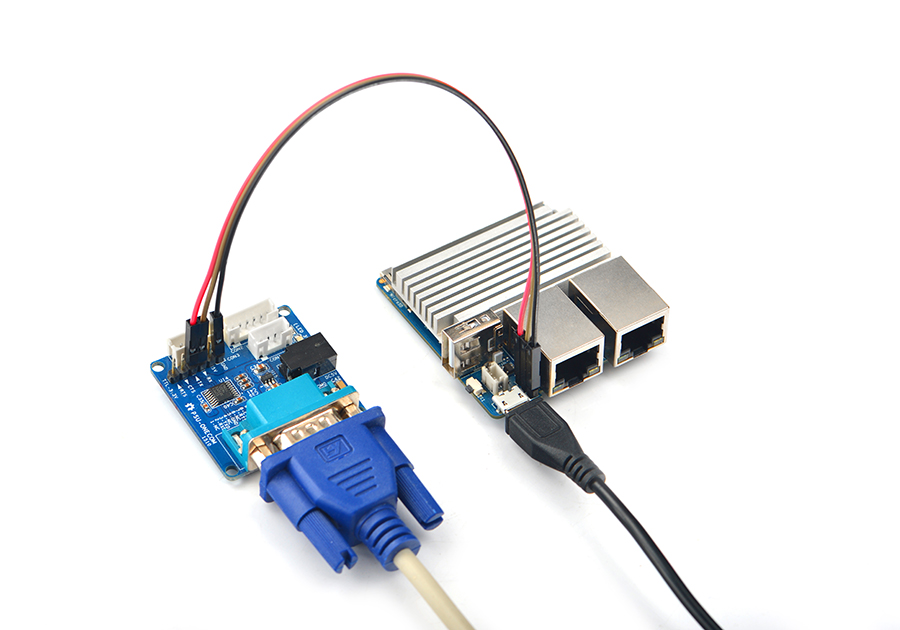
or you can use a USB to serial board and power on the whole system at the MicroUSB port with a 5V/2A power:
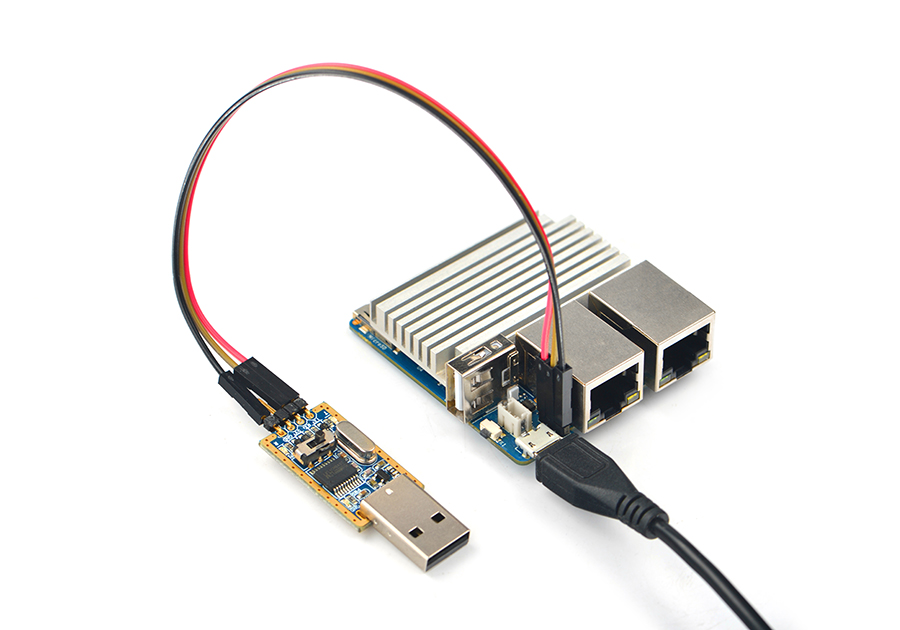
By default you will login as root without a password. You can use "passwd" to set a password for root.
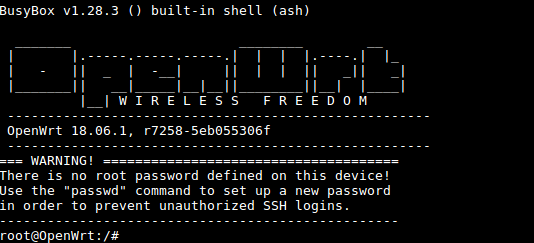
On first boot the system will automatically extend the file system on the TF card to the max capacity:
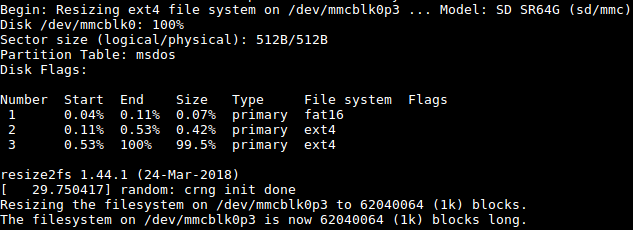
Please wait for this to be done.
- Login via SSH
In FriendlyElec's OpenWrt system the Ethernet(eth0) is configured as WAN.
Before power on your board make sure your board is connected to a master router's LAN with an Ethernet cable and the eth0 will be assigned an IP address by DHCP.
For example, if your eth0 is assigned an IP address 192.168.1.163 you can login with SSH by running the following command:
$ ssh root@192.168.1.163
You can login without a password.
- Login via Web
You can login OpenWrt via a LuCI Web page.
After you go through all the steps in <Login via SSH> and get an IP address e.g. 192.168.1.163 for the Ethernet connection, type this IP address in a browser's address bar and you will be able to login OpenWrt-LuCI:
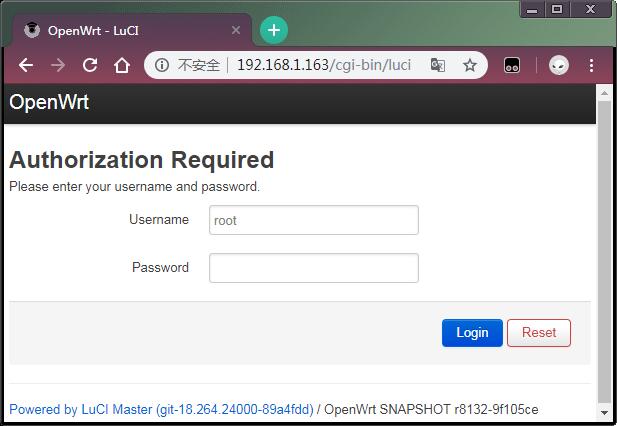
By default you will login as root without a password, just click on "Login" to login.
5.3 Manage Software Packages
OpenWrt has a package management utility: opkg. You can get its details by running the following command:
$ opkg
Package Manipulation:
update Update list of available packages
upgrade <pkgs> Upgrade packages
install <pkgs> Install package(s)
configure <pkgs> Configure unpacked package(s)
remove <pkgs|regexp> Remove package(s)
flag <flag> <pkgs> Flag package(s)
<flag>=hold|noprune|user|ok|installed|unpacked (one per invocation)
Informational Commands:
list List available packages
list-installed List installed packages
list-upgradable List installed and upgradable packages
list-changed-conffiles List user modified configuration files
files <pkg> List files belonging to <pkg>
search <file|regexp> List package providing <file>
find <regexp> List packages whose name or description matches <regexp>
info [pkg|regexp] Display all info for <pkg>
status [pkg|regexp] Display all status for <pkg>
download <pkg> Download <pkg> to current directory
...These are just part of the manual. Here are some popular opkg commands.
- Update Package List
Before you install a package you'd better update the package list:
$ opkg update
- Check Available Packages
$ opkg list
At the time of writing there are 3241 packages available.
- Check Installed Packages:
$ opkg list-installed
At the time of writing 124 packages have been installed.
- Install/Delete Packages:
$ opkg install <pkgs> $ opkg remove <pkgs>
- Check Files Contained in Installed Packages:
$ opkg files <pkg>
- Install Chinese Language Package for LuCI
$ opkg install luci-i18n-base-zh-cn
- Check Changed Files:
$ opkg list-changed-conffiles
- Reference Links:
5.4 Check System Status
- Check CPU Temperature & Frequency via Commandline
$ cpu_freq
Aavailable frequency(KHz):
480000 624000 816000 1008000
Current frequency(KHz):
CPU0 online=1 temp=26548C governor=ondemand freq=624000KHz
CPU1 online=1 temp=26548C governor=ondemand freq=624000KHz
CPU2 online=1 temp=26548C governor=ondemand freq=624000KHz
CPU3 online=1 temp=26548C governor=ondemand freq=624000KHzThese messages mean that there are four CPU cores working online simultaneously. Each core's temperature is 26.5 degrees in Celsius, the scheduling policy is on-demand and the working frequency is 624MHz. You can set the frequency by running the following command:
$ cpu_freq -s 1008000
Aavailable frequency(KHz):
480000 624000 816000 1008000
Current frequency(KHz):
CPU0 online=1 temp=36702C governor=userspace freq=1008000KHz
CPU1 online=1 temp=36702C governor=userspace freq=1008000KHz
CPU2 online=1 temp=36702C governor=userspace freq=1008000KHz
CPU3 online=1 temp=36702C governor=userspace freq=1008000KHzThese messages mean four CPU cores are working online. Each core's temperature is 26.5 degrees. Each core's governor is on demand and the frequency is 480 MHz.
- Check System Status on OpenWrt-LuCI Web Page
After open the OpenWrt-LuCI page, go to "Statistics ---> Graphs" and you will see various system statistics e.g.:
1) System Load:
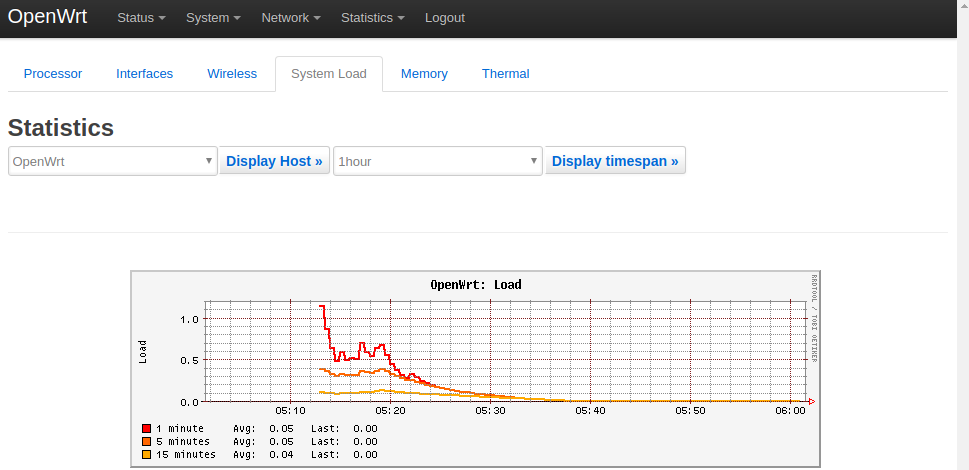
2) RAM:
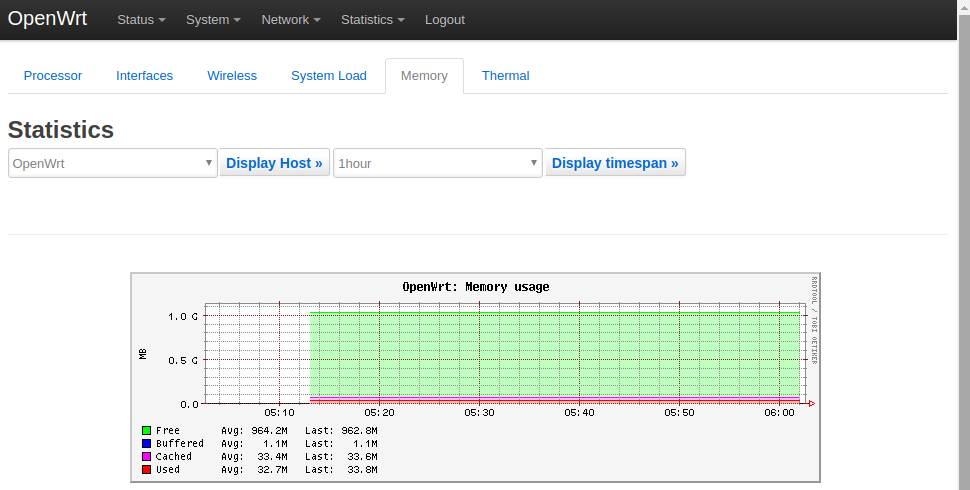
3) CPU Temperature:
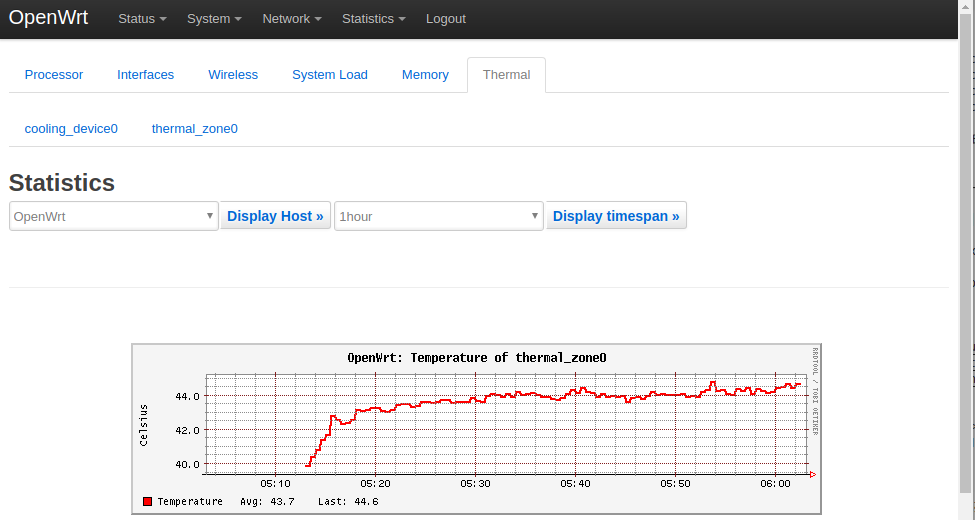
All the statistics listed on the Statistics page are presented by the luci-app-statistics package which uses the Collectd utility to collect data and presents them with the RRDtool utility.
If you want to get more statistics you can install other collectd-mod-* packages.
All collectd-mod-* packages use the same configuration file: /etc/config/luci_statistics.
- Reference Links:
5.5 Check Network->Interfaces Configurations
- After open the OpenWrt-LuCI page, go to "Network" ---> "Interfaces" and you will see the current network's configurations:
- All the configurations listed on the Network->Interfaces page are stored in the "/etc/config/network" file.
5.6 Check Netwrok->Wireless Configurations
- After open the OpenWrt-LuCI page, go to Network ---> Wireless and you will see the WiFi hotspot's configurations:
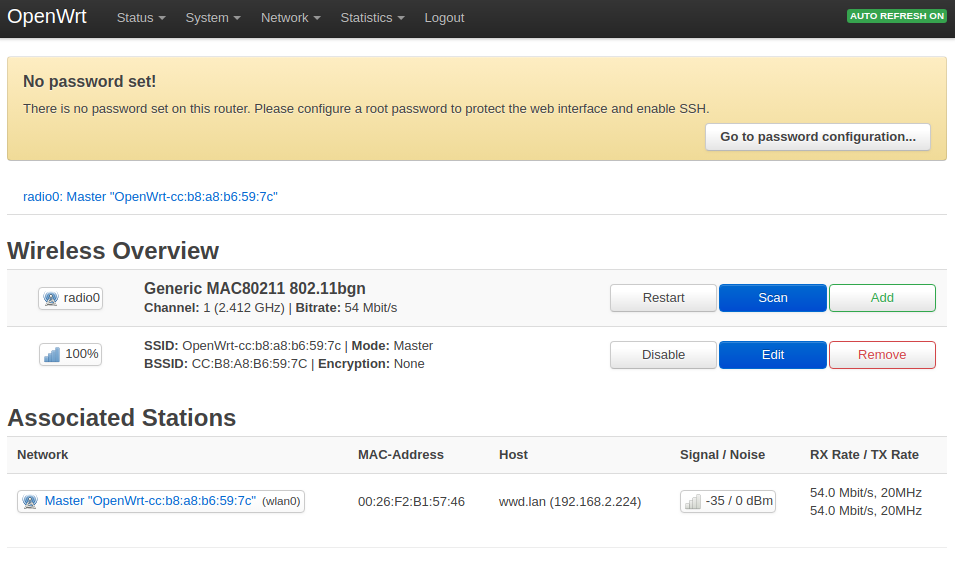
A default WiFi AP's hotspot name looks like "OpenWrt-10:d0:7a:de:3d:92". It doesn't have a password. You can connect your smart phone to it and browse the internet.
- All the configurations listed on the Network->Wireless page are stored in the "/etc/config/wireless" file.
5.7 Check LED Configurations
- After open the OpenWrt-LuCI page, go to System ---> LED Configuration and you will see the LED's configurations:
- By default the LED is configured as follows:
LED1: heart-beat LED. If this LED doesn't blink it means the system is dead and it needs to be restarted.
LED2: status LED for Gbps Ethernet eth0 WAN. If WAN works this LED will be solid on otherwise it will be off. You can check the "Transmit" / "Receive" box to set the LED to blink when WAN transmits / receives data.
LED3: status LED for Fast Ethernet eth1 LAN. If LAN works this LED will be solid on otherwise it will be off. You can check the "Transmit" / "Receive" box to set the LED to blink when LAN transmits / receives data.
- Reference Links:
5.8 Check BUTTON Configurations
FriendlyElec's OpenWrt system uses the triggerhappy utility to configure BUTTON's functions. By default when BUTTON is pressed a reboot will be triggered.
If the system needs to be rebooted we suggest you use BUTTON to trigger a reboot. This prevents the file system from being damaged by accidental system shutdown.
The configurations for the triggerhappy utility are stored in the "/etc/triggerhappy/triggers.d/example.conf" file.
- Reference Links:
5.9 USB WiFi
Currently the NanoPi NEO2 Black only works with a RTL8821CU USB WiFi dongle, plug and play. After this module is connected to the board it will by default work under AP mode and the hotspot's name is "rtl8821cu-mac address" and the password is "password";
5.10 Huawei's WiFi 2 mini(E8372H-155) Module
After this module is connected to the board it will be plug and play. The hotspot's name is "HUAWEI-8DA5". You can connect a device to the internet by connecting to this hotspot.
6 Work with FriendlyCore
6.1 Introduction
FriendlyCore is a light Linux system without X-windows, based on ubuntu core, It uses the Qt-Embedded's GUI and is popular in industrial and enterprise applications.
Besides the regular Ubuntu Core's features FriendlyCore has the following additional features:
- it integrates Qt4.8;
- it integrates NetworkManager;
- it has bluez and Bluetooth related packages;
- it has alsa packages;
- it has npi-config;
- it has RPiGPIO, a Python GPIO module;
- it has some Python/C demo in /root/ directory;
- it enables 512M-swap partition;
6.2 System Login
- If your board is connected to an HDMI monitor you need to use a USB mouse and keyboard.
- If you want to do kernel development you need to use a serial communication board, ie a PSU-ONECOM board, which will
allow you to operate the board via a serial terminal.Here is a setup where we connect a board to a PC via the PSU-ONECOM and you can power on your board from either the PSU-ONECOM or its MicroUSB:

You can use a USB to Serial conversion board too.
Make sure you use a 5V/2A power to power your board from its MicroUSB port:

- FriendlyCore User Accounts:
Non-root User:
User Name: pi Password: pi
Root:
User Name: root Password: fa
The system is automatically logged in as "pi". You can do "sudo npi-config" to disable auto login.
- Update packages
$ sudo apt-get update
6.3 Configure System with npi-config
The npi-config is a commandline utility which can be used to initialize system configurations such as user password, system language, time zone, Hostname, SSH switch , Auto login and etc. Type the following command to run this utility.
$ sudo npi-config
Here is how npi-config's GUI looks like:
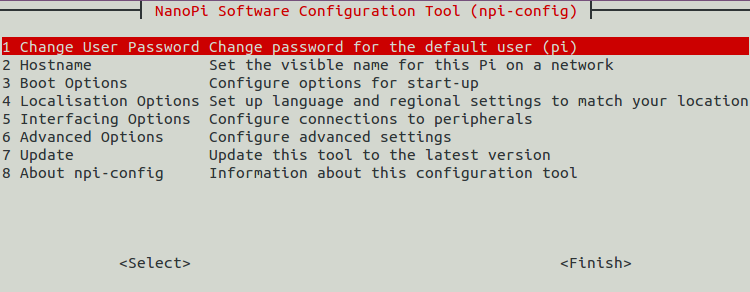
6.4 Develop Qt Application
Please refer to: How to Build and Install Qt Application for FriendlyELEC Boards
6.5 Setup Program to AutoRun
You can setup a program to autorun on system boot with npi-config:
sudo npi-configGo to Boot Options -> Autologin -> Qt/Embedded, select Enable and reboot.
6.6 Extend TF Card's Section
When FriendlyCore is loaded the TF card's section will be automatically extended.You can check the section's size by running the following command:
$ df -h
6.7 WiFi
For either an SD WiFi or a USB WiFi you can connect it to your board in the same way. The APXX series WiFi chips are SD WiFi chips. By default FriendlyElec's system supports most popular USB WiFi modules. Here is a list of the USB WiFi modules we tested:
Index Model 1 RTL8188CUS/8188EU 802.11n WLAN Adapter 2 RT2070 Wireless Adapter 3 RT2870/RT3070 Wireless Adapter 4 RTL8192CU Wireless Adapter 5 mi WiFi mt7601 6 5G USB WiFi RTL8821CU 7 5G USB WiFi RTL8812AU
You can use the NetworkManager utility to manage network. You can run "nmcli" in the commandline utility to start it. Here are the commands to start a WiFi connection:
- Change to root
$ su root
- Check device list
$ nmcli devNote: if the status of a device is "unmanaged" it means that device cannot be accessed by NetworkManager. To make it accessed you need to clear the settings under "/etc/network/interfaces" and reboot your system.
- Start WiFi
$ nmcli r wifi on- Scan Surrounding WiFi Sources
$ nmcli dev wifi- Connect to a WiFi Source
$ nmcli dev wifi connect "SSID" password "PASSWORD" ifname wlan0
The "SSID" and "PASSWORD" need to be replaced with your actual SSID and password.If you have multiple WiFi devices you need to specify the one you want to connect to a WiFi source with iface
If a connection succeeds it will be automatically setup on next system reboot.
For more details about NetworkManager refer to this link: Use NetworkManager to configure network settings
If your USB WiFi module doesn't work most likely your system doesn't have its driver. For a Debian system you can get a driver from Debian-WiFi and install it on your system. For a Ubuntu system you can install a driver by running the following commands:
$ apt-get install linux-firmware
In general all WiFi drivers are located at the "/lib/firmware" directory.
6.8 Ethernet Connection
If a board is connected to a network via Ethernet before it is powered on it will automatically obtain an IP with DHCP activated after it is powered up. If you want to set up a static IP refer to: Use NetworkManager to configure network settings。
6.9 Custom welcome message
The welcome message is printed from the script in this directory:
/etc/update-motd.d/
For example, to change the FriendlyELEC LOGO, you can change the file /etc/update-motd.d/10-header. For example, to change the LOGO to HELLO, you can change the following line:
TERM=linux toilet -f standard -F metal $BOARD_VENDOR
To:
TERM=linux toilet -f standard -F metal HELLO
6.10 Modify timezone
For exampe, change to Shanghai timezone:
sudo rm /etc/localtime sudo ln -ls /usr/share/zoneinfo/Asia/Shanghai /etc/localtime
6.11 Connect to USB Camera(FA-CAM202)
The FA-CAM202 is a 200M USB camera. Connect your board to camera module. Then boot OS, connect your board to a network, log into the board as root and run "mjpg-streamer":
$ cd /root/C/mjpg-streamer $ make $ ./start.sh
You need to change the start.sh script and make sure it uses a correct /dev/videoX node. You can check your camera's node by running the following commands:
$ apt-get install v4l-utils $ v4l2-ctl -d /dev/video0 -D Driver Info (not using libv4l2): Driver name : uvcvideo Card type : HC 3358+2100: HC 3358+2100 / USB 2.0 Camera: USB 2.0 Camera Bus info : usb-1c1b000.usb-1 ...
The above messages indicate that "/dev/video0" is camera's device node.The mjpg-streamer application is an open source video steam server. After it is successfully started the following messages will be popped up:
$ ./start.sh i: Using V4L2 device.: /dev/video0 i: Desired Resolution: 1280 x 720 i: Frames Per Second.: 30 i: Format............: YUV i: JPEG Quality......: 90 o: www-folder-path...: ./www/ o: HTTP TCP port.....: 8080 o: username:password.: disabled o: commands..........: enabled
start.sh runs the following two commands:
export LD_LIBRARY_PATH="$(pwd)" ./mjpg_streamer -i "./input_uvc.so -d /dev/video0 -y 1 -r 1280x720 -f 30 -q 90 -n -fb 0" -o "./output_http.so -w ./www"
Here are some details for mjpg_streamer's major options:
-i: input device. For example "input_uvc.so" means it takes input from a camera;
-o: output device. For example "output_http.so" means the it transmits data via http;
-d: input device's subparameter. It defines a camera's device node;
-y: input device's subparameter. It defines a camera's data format: 1:yuyv, 2:yvyu, 3:uyvy 4:vyuy. If this option isn't defined MJPEG will be set as the data format;
-r: input device's subparameter. It defines a camera's resolution;
-f: input device's subparameter. It defines a camera's fps. But whether this fps is supported depends on its driver;
-q: input device's subparameter. It defines the quality of an image generated by libjpeg soft-encoding;
-n: input device's subparameter. It disables the dynctrls function;
-fb: input device's subparameter. It specifies whether an input image is displayed at "/dev/fbX";
-w: output device's subparameter. It defines a directory to hold web pages;
In our case the board's IP address was 192.168.1.230. We typed 192.168.1.230:8080 in a browser and were able to view the images taken from the camera's. Here is what you would expect to observe:
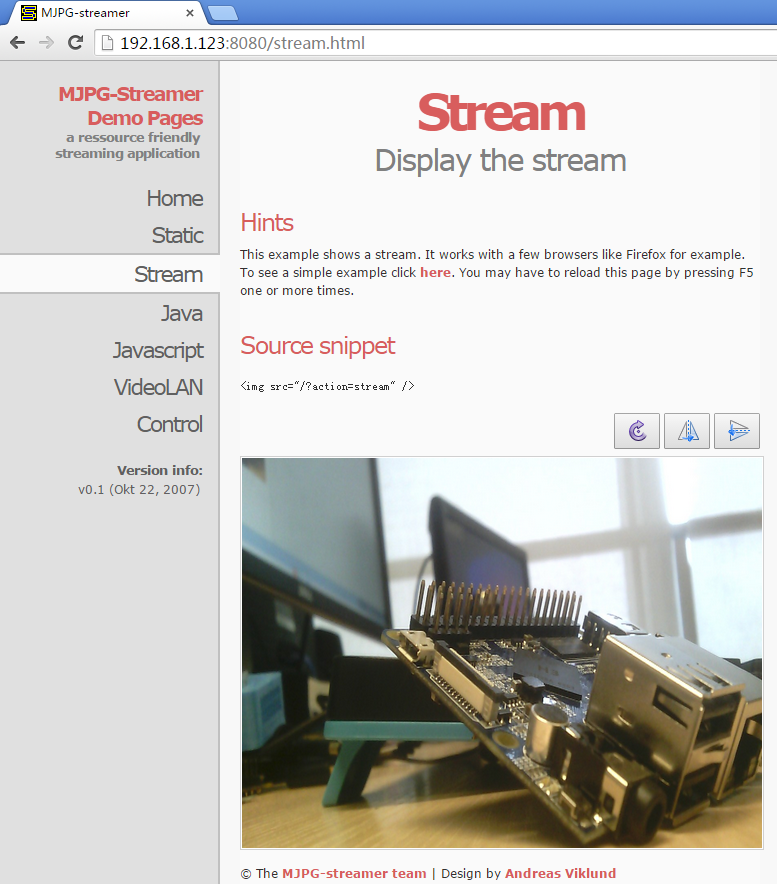
6.12 Check CPU's Working Temperature
You can get CPU's working temperature by running the following command:
$ cpu_freq
Aavailable frequency(KHz):
480000 624000 816000 1008000
Current frequency(KHz):
CPU0 online=1 temp=26548C governor=ondemand freq=624000KHz
CPU1 online=1 temp=26548C governor=ondemand freq=624000KHz
CPU2 online=1 temp=26548C governor=ondemand freq=624000KHz
CPU3 online=1 temp=26548C governor=ondemand freq=624000KHzThis message means there are currently four CPUs working. All of their working temperature is 26.5 degree in Celsius and each one's clock is 624MHz.
Set CPU frequency:
$ cpu_freq -s 1008000
Aavailable frequency(KHz):
480000 624000 816000 1008000
Current frequency(KHz):
CPU0 online=1 temp=36702C governor=userspace freq=1008000KHz
CPU1 online=1 temp=36702C governor=userspace freq=1008000KHz
CPU2 online=1 temp=36702C governor=userspace freq=1008000KHz
CPU3 online=1 temp=36702C governor=userspace freq=1008000KHz
6.13 Test Infrared Receiver
Note: Please Check your board if IR receiver exist.
By default the infrared function is disabled you can enable it by using the npi-config utility:
$ npi-config
6 Advanced Options Configure advanced settings
A8 IR Enable/Disable IR
ir Enable/Disable ir[enabled]Reboot your system and test its infrared function by running the following commands:
$ apt-get install ir-keytable $ echo "+rc-5 +nec +rc-6 +jvc +sony +rc-5-sz +sanyo +sharp +mce_kbd +xmp" > /sys/class/rc/rc0/protocols # Enable infrared $ ir-keytable -t Testing events. Please, press CTRL-C to abort.
"ir-keytable -t" is used to check whether the receiver receives infrared signals. You can use a remote control to send infrared signals to the receiver. If it works you will see similar messages as follows:
1522404275.767215: event type EV_MSC(0x04): scancode = 0xe0e43 1522404275.767215: event type EV_SYN(0x00). 1522404278.911267: event type EV_MSC(0x04): scancode = 0xe0e42 1522404278.911267: event type EV_SYN(0x00).
6.14 How to install and use docker (for armhf system)
6.14.1 How to Install Docker
Run the following commands:
sudo apt-get update sudo apt-get install docker.io
6.14.2 Test Docker installation
Test that your installation works by running the simple docker image:
git clone https://github.com/friendlyarm/debian-jessie-arm-docker cd debian-jessie-arm-docker ./rebuild-image.sh ./run.sh
7 Developer's Guide
- System Development
- System Configurations
- Hardware Access
8 资源链接
8.1 手册原理图等开发资料
9 ChangeLog
2023-11-07
h3 FriendlyCore:
- Upgrade to Ubuntu Core 22.04;
h3 Debian Core:
- Add Debian bookworm core;
